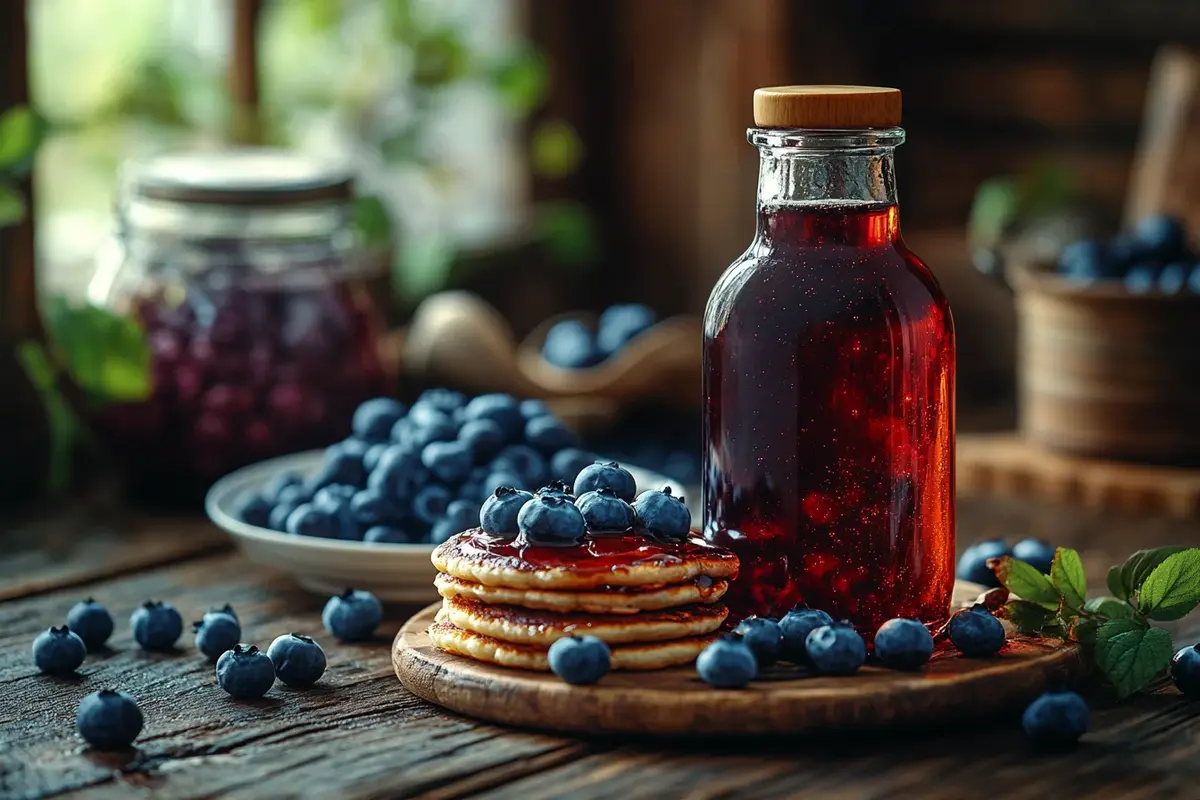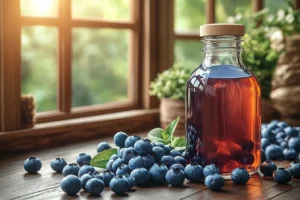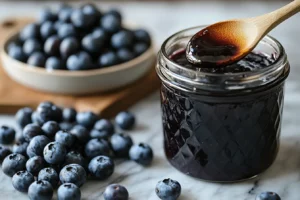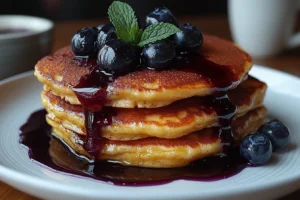Blueberry syrup is one of those intriguing culinary delights that many people stumble upon when seeking something flavorful and unique. Whether you’re a breakfast enthusiast, a fan of homemade recipes, or someone curious about the nutritional benefits of fruit-based syrups, this article has you covered. From understanding what blueberry syrup is to exploring its uses and even learning how to make your own, we’ll dive into every detail to ensure you’re well-informed. So, does blueberry syrup really exist? Absolutely, and it’s as versatile and delicious as it sounds! Let’s begin.
Understanding Blueberry Syrup
What is Blueberry Syrup?
Blueberry syrup is a sweet, fruity liquid made primarily from blueberries, sugar, and water. It’s typically thickened through natural sugars and optional additives like cornstarch. While similar to blueberry sauce, syrup is specifically crafted for its pourable consistency, making it a perfect addition to pancakes, waffles, and even beverages. But there’s more to it than just its culinary applications!
Definition and Basic Components
Blueberry syrup starts with ripe blueberries, which are simmered down to extract their rich, tangy essence. Combining them with sugar enhances the natural sweetness, while lemon juice adds a touch of acidity to balance the flavors. Store-bought options might include preservatives or thickeners, but homemade versions are often more wholesome, allowing complete control over the ingredients.
Historical Background of Fruit Syrups
The concept of fruit syrups, including blueberry syrup, has deep roots in culinary history. Originally, these syrups were created to preserve fruit flavors during the off-season. Blueberries, being native to North America, were a natural choice for early settlers who used them in everything from jams to syrups. Over time, blueberry syrup has evolved into a beloved staple for breakfast dishes and creative desserts.
Understanding Blueberry Syrup
What is Blueberry Syrup?
Blueberry syrup is a delightful fruit-based condiment that has found its way into kitchens worldwide. It’s cherished for its vibrant color, rich taste, and versatility in various culinary applications. Whether you prefer it drizzled over pancakes or mixed into beverages, this syrup transforms ordinary dishes into extraordinary experiences. But what exactly makes blueberry syrup so special? Let’s break it down.
Definition and Basic Components
At its core, blueberry syrup is a simple blend of fresh blueberries, sugar, water, and sometimes a hint of lemon juice. The berries are cooked down to release their natural juices, creating a thick, flavorful liquid that’s sweet yet slightly tangy. Unlike blueberry sauce, which might include chunks of fruit, syrup is smooth and pourable. Store-bought varieties often include stabilizers and preservatives, but homemade versions are free from unnecessary additives, offering a healthier, more customizable option.
Historical Background of Fruit Syrups
Fruit syrups have been a part of culinary traditions for centuries. Native Americans were among the first to harvest wild blueberries and preserve them for winter months, creating early versions of syrups and jams. European settlers adopted these methods, and as sugar became more accessible, fruit syrups evolved into a staple for enhancing meals. Today, blueberry syrup stands out not only for its taste but also for its antioxidant-rich properties, making it a modern favorite in both home kitchens and restaurants.
Availability of Blueberry Syrup
Commercial Availability
Blueberry syrup is no longer a niche product—it’s widely available and can be found in most grocery stores, online marketplaces, and even specialty shops. Thanks to its popularity, it’s offered in different forms, from classic pancake syrups to organic, sugar-free alternatives. The wide variety caters to everyone, whether you’re looking for a gourmet addition or an affordable option for everyday use.
Popular Brands Offering Blueberry Syrup
Several brands have embraced the demand for blueberry syrup, creating products that range in quality and flavor profiles.
- Stonewall Kitchen offers a premium syrup made from real wild blueberries, boasting an intense, natural flavor.
- Smucker’s provides a more affordable, family-friendly option that pairs perfectly with pancakes.
- Torani, a favorite for beverages, produces blueberry syrup specifically designed for cocktails and coffee drinks.
Organic brands like Wholesome Sweeteners also offer syrups that are free from artificial additives, appealing to health-conscious buyers.
Where to Purchase Blueberry Syrup
Finding blueberry syrup is easier than ever. You can purchase it:
- In-store: Grocery chains like Whole Foods, Walmart, and Trader Joe’s typically stock popular brands.
- Online: E-commerce platforms such as Amazon, Thrive Market, and specialty food sites offer a broad selection.
- Local Farmers’ Markets: Artisanal syrups are often sold at farmers’ markets, where you can support local businesses and discover unique flavors.
Whether you prefer to shop locally or online, blueberry syrup is readily accessible to satisfy your culinary needs.
Homemade Blueberry Syrup
Making Blueberry Syrup at Home
Nothing beats the satisfaction of crafting your own blueberry syrup. Homemade versions let you control the sweetness, avoid unnecessary additives, and create a syrup tailored to your taste. With just a handful of ingredients and a little time, you can enjoy a fresh, delicious product perfect for enhancing breakfasts and desserts alike.
Simple Blueberry Syrup Recipe
Making blueberry syrup is straightforward and requires only a few pantry staples. Here’s a quick recipe:
Ingredients:
- 2 cups fresh or frozen blueberries
- 1 cup granulated sugar
- 1 cup water
- 1 tablespoon lemon juice
Instructions:
- In a saucepan, combine the blueberries, sugar, and water.
- Bring the mixture to a boil over medium heat, stirring occasionally to dissolve the sugar.
- Reduce the heat and simmer for 10–15 minutes, until the blueberries release their juices and the syrup thickens slightly.
- Strain the mixture through a fine-mesh sieve to remove solids, pressing the blueberries to extract maximum flavor.
- Stir in the lemon juice for a fresh, tangy finish. Let it cool before storing in an airtight container.
This homemade syrup can be refrigerated for up to two weeks, making it a convenient and versatile addition to your kitchen.
Tips for Perfecting Homemade Blueberry Syrup
- Use High-Quality Blueberries: Opt for fresh, plump berries in season or high-grade frozen blueberries for the best flavor.
- Adjust the Sweetness: Tailor the sugar amount to suit your preference. For a healthier twist, substitute sugar with honey or maple syrup.
- Enhance with Spices: Add cinnamon, vanilla extract, or a pinch of nutmeg for a more complex flavor profile.
- Control the Consistency: For a thicker syrup, dissolve a teaspoon of cornstarch in water and add it during the simmering process.
- Experiment with Add-Ins: Combine blueberries with other fruits, like raspberries or blackberries, for a unique blend.
Homemade blueberry syrup is not only easy to make but also customizable, ensuring it’s exactly how you like it every time.
Uses of Blueberry Syrup
Culinary Applications
Blueberry syrup’s sweet, tangy flavor makes it incredibly versatile in the kitchen. Whether you’re enhancing a savory breakfast or creating decadent desserts, it’s a must-have ingredient that never fails to impress.
Breakfast Dishes
Breakfast and blueberry syrup go hand in hand. Here are some popular ways to incorporate it into your morning meal:
- Pancakes and Waffles: Drizzle warm syrup over fluffy pancakes or crispy waffles for a classic breakfast treat.
- French Toast: Use blueberry syrup as a topping or mix it into the batter for a fruity twist.
- Yogurt and Granola: Stir a spoonful of syrup into plain yogurt or drizzle over granola for a healthy, sweet boost.
- Oatmeal: Elevate your oatmeal by adding a swirl of syrup, making every bite bursting with blueberry goodness.
Desserts and Beverages
Blueberry syrup isn’t limited to breakfast—it shines in desserts and drinks too.
- Ice Cream Topping: Pour it over vanilla or cheesecake-flavored ice cream for a gourmet dessert.
- Cheesecakes and Pies: Use as a glaze or drizzle for baked goods like cheesecake, pies, or tarts.
- Cocktails and Mocktails: Mix it into sparkling water, lemonade, or non-alcoholic spritzers for a refreshing drink.
- Milkshakes and Smoothies: Add a tablespoon of blueberry syrup for a vibrant, fruity flavor in your favorite drinks.
Whether you’re adding flair to breakfast or transforming desserts into showstoppers, blueberry syrup is a versatile addition to any recipe.
Nutritional Information
Nutritional Profile of Blueberry Syrup
Blueberry syrup isn’t just a treat for your taste buds—it offers a range of nutrients, too. While it’s primarily a sweetener, its use of real blueberries adds a nutritious twist. However, the exact nutritional value depends on whether it’s homemade or store-bought. Let’s break down its key components.
Caloric Content
Blueberry syrup typically contains around 50–70 calories per tablespoon, primarily from sugar. Homemade versions allow for better calorie control since you can adjust the sweetness to suit your dietary goals. Store-bought options might be higher in calories due to added sugars, so always check the label if you’re watching your intake.
Vitamins and Minerals
Blueberries themselves are nutrient powerhouses, and their benefits carry over into the syrup to some extent:
- Vitamin C: Blueberry syrup retains traces of vitamin C, which supports immune health and skin vitality.
- Manganese: This essential mineral aids in bone health and metabolism.
- Antioxidants: Even in syrup form, blueberries provide compounds like anthocyanins that help fight free radicals in the body.
Keep in mind that homemade syrups, especially those made with minimal processing, tend to retain more nutrients than heavily processed commercial varieties.
Health Benefits and Considerations
Health Benefits of Blueberries
Blueberries are often dubbed a superfood—and for good reason. Packed with antioxidants, vitamins, and fiber, they contribute to overall health and well-being. When used in syrup form, many of these benefits remain intact, albeit in smaller amounts. Let’s explore why blueberries are so beneficial.
Antioxidant Properties
Blueberries are rich in anthocyanins, the compounds responsible for their deep blue hue and powerful antioxidant effects. These antioxidants:
- Protect cells from damage caused by free radicals.
- Reduce inflammation, which is linked to chronic conditions like heart disease and arthritis.
- Support brain health by combating oxidative stress, potentially improving memory and cognitive function.
Adding blueberry syrup to your meals can be a simple and enjoyable way to incorporate these health-boosting antioxidants into your diet.
Potential Health Risks
While blueberry syrup offers many benefits, there are some considerations to keep in mind:
- Sugar Content: Both homemade and store-bought versions are high in sugar, which can contribute to weight gain and blood sugar spikes if consumed excessively.
- Allergies: Though rare, some individuals may have allergies to blueberries.
- Additives in Commercial Syrups: Preservatives and artificial flavorings in store-bought varieties might trigger sensitivities in some people.
By opting for homemade syrup or checking ingredient labels carefully, you can enjoy the benefits of blueberries while minimizing potential drawbacks.
Storage and Shelf Life
Proper Storage Techniques
Storing blueberry syrup correctly ensures its flavor and quality remain intact for as long as possible. Whether you’ve made it at home or purchased a store-bought version, proper handling is key to preventing spoilage and maintaining freshness. Here’s what you need to know.
Refrigeration and Freezing
Homemade blueberry syrup should always be stored in an airtight container and refrigerated after cooling completely. When refrigerated, it typically lasts up to two weeks. For long-term storage, freezing is an excellent option. Pour the syrup into freezer-safe containers, leaving some space for expansion, and freeze for up to six months. Thaw frozen syrup in the refrigerator overnight before use, and give it a quick stir to restore its smooth consistency.
Shelf Life of Homemade vs. Store-Bought Syrup
- Homemade Syrup: Without preservatives, homemade syrup has a shorter shelf life. Always check for signs of spoilage, such as mold or an off smell, before use.
- Store-Bought Syrup: Commercial options often contain preservatives, extending their shelf life to several months or even a year. However, once opened, they should be refrigerated and consumed within the timeframe specified on the label.
Proper storage not only preserves the taste but also ensures your syrup is safe for consumption.
Variations of Blueberry Syrup
Flavor Enhancements
Blueberry syrup is delicious on its own, but it can be elevated with creative twists to suit different palates. By experimenting with spices, herbs, and other fruits, you can craft unique variations that bring out even more depth of flavor.
Adding Spices and Herbs
Incorporating spices and herbs can turn your blueberry syrup into a gourmet creation. Popular choices include:
- Cinnamon: Adds warmth and a comforting aroma, making it perfect for fall-inspired recipes.
- Vanilla Bean: Infuses a rich, creamy undertone that pairs beautifully with blueberries.
- Mint: Provides a refreshing twist, ideal for drizzling over summer desserts or beverages.
To use, simply add these ingredients during the simmering process and strain them out before bottling the syrup.
Combining with Other Fruits
Blending blueberries with complementary fruits creates dynamic and exciting flavors. Consider these combinations:
- Raspberry and Blueberry: A tart and tangy pairing that’s perfect for breakfast dishes.
- Peach and Blueberry: Adds a sweet, juicy contrast to the blueberries’ richness.
- Strawberry and Blueberry: A classic duo that works wonderfully as a topping for pancakes or ice cream.
These variations allow you to customize your syrup to fit the occasion or your personal taste, keeping things fun and versatile in the kitchen.
Popular Culture
Blueberry Syrup in Restaurants and Cafes
Blueberry syrup has found its way into the menus of restaurants and cafes, becoming a popular choice for enhancing dishes and beverages. Its vibrant color and distinct flavor make it a standout ingredient that chefs and baristas love to showcase. Whether it’s featured in breakfast specialties or seasonal drinks, blueberry syrup adds a touch of sophistication to dining experiences.
Signature Dishes Featuring Blueberry Syrup
Many eateries highlight blueberry syrup in their signature creations. From fluffy pancakes topped with a generous drizzle to artisanal French toast with a blueberry glaze, these dishes exemplify how versatile the syrup can be. Some cafes even use it in savory dishes, pairing it with items like roasted vegetables or grilled meats for a surprising twist.
Seasonal Menus and Blueberry Syrup
Blueberry syrup often makes a star appearance on seasonal menus, especially during summer when blueberries are in peak harvest. Restaurants might offer special desserts, such as blueberry parfaits or ice cream sundaes, while cafes create limited-edition beverages, like blueberry-infused lattes or sparkling mocktails. These seasonal offerings highlight the syrup’s adaptability and appeal to customers looking for fresh, fruity flavors.
Economic Impact of Blueberry Syrup
Blueberry Farming and Syrup Production
The production of blueberry syrup plays a notable role in agriculture and the economy, especially in regions where blueberries are a major crop. North America, for instance, is a leading producer of blueberries, with states like Maine, Michigan, and Oregon contributing significantly to the industry. Farmers not only supply fresh blueberries for immediate consumption but also provide the raw materials for syrups, jams, and other processed goods.
Economic Significance in Agriculture
Blueberry farming supports local economies by creating jobs and fostering tourism. U-pick blueberry farms are popular attractions, allowing visitors to harvest their own berries while learning about sustainable farming practices. Additionally, the production of value-added products like syrup increases the profitability of blueberry crops, helping farmers remain competitive in the agricultural market.
Market Trends and Consumer Demand
The demand for blueberry syrup continues to grow, driven by consumers’ increasing interest in natural, fruit-based products. Organic and preservative-free syrups are especially popular among health-conscious buyers. According to market research, the global blueberry market is projected to expand significantly, with syrups and other processed products contributing to this growth. As more people discover the culinary and nutritional benefits of blueberries, the future of blueberry syrup looks bright.
Environmental Considerations
Sustainability in Blueberry Cultivation
Sustainability has become a crucial factor in agriculture, and blueberry farming is no exception. Blueberries thrive in nutrient-rich, well-drained soils, making them a relatively low-impact crop compared to others. However, conventional farming methods can still lead to soil degradation, pesticide use, and water consumption challenges. Adopting sustainable practices not only helps the environment but also improves the quality of the blueberries used for syrup production.
Organic Farming Practices
Organic blueberry farming prioritizes sustainability and environmental health. Farmers avoid synthetic pesticides and fertilizers, opting for natural compost and organic pest control methods instead. Additionally, organic farms often use techniques like crop rotation and cover cropping to maintain soil fertility and reduce erosion. These methods not only support biodiversity but also produce healthier, chemical-free blueberries, making organic farming a win-win for consumers and the planet.
Environmental Impact of Syrup Production
The production process for blueberry syrup also has environmental implications. Commercial syrup manufacturing often involves packaging materials like plastic and glass, which can contribute to waste if not recycled. To minimize the environmental footprint, many companies are turning to eco-friendly packaging options, such as biodegradable or recyclable materials. Additionally, locally sourced blueberries reduce transportation emissions, supporting sustainable supply chains.
By prioritizing eco-conscious farming and production methods, the blueberry syrup industry can continue to grow responsibly while reducing its environmental impact.
Frequently Asked Questions (FAQs)
Here are answers to some common questions about blueberry syrup, covering everything from its ingredients to its uses.
Is blueberry syrup gluten-free?
Yes, blueberry syrup is typically gluten-free. It is made from blueberries, sugar, and water, and doesn’t contain gluten unless cross-contamination occurs during manufacturing. If you have gluten sensitivities, always check the label for confirmation.
Can I use frozen blueberries to make syrup?
Absolutely! Frozen blueberries are a convenient and cost-effective option for making blueberry syrup. They retain their nutritional value and flavor, making them an excellent substitute for fresh berries when they’re out of season.
How long does homemade blueberry syrup last?
Homemade blueberry syrup, when stored in an airtight container in the refrigerator, typically lasts about two weeks. For longer storage, you can freeze the syrup in small portions for up to six months.
What are some alternatives to blueberry syrup?
If you’re out of blueberry syrup, you can use similar fruit-based syrups like raspberry, strawberry, or blackberry. Honey, maple syrup, or even blueberry jam thinned with water are also great substitutes in a pinch.
Does blueberry syrup contain preservatives?
Homemade blueberry syrup usually doesn’t contain preservatives, making it a healthier option. Store-bought versions may include preservatives to extend shelf life, so it’s best to read the ingredient label to know exactly what you’re consuming.
Can blueberry syrup be used in savory dishes?
Yes, blueberry syrup can be used in savory dishes! Its sweet and tangy flavor pairs well with roasted meats, grilled vegetables, or even as a glaze for poultry. For a more balanced flavor, combine it with herbs or spices like rosemary or chili flakes.



